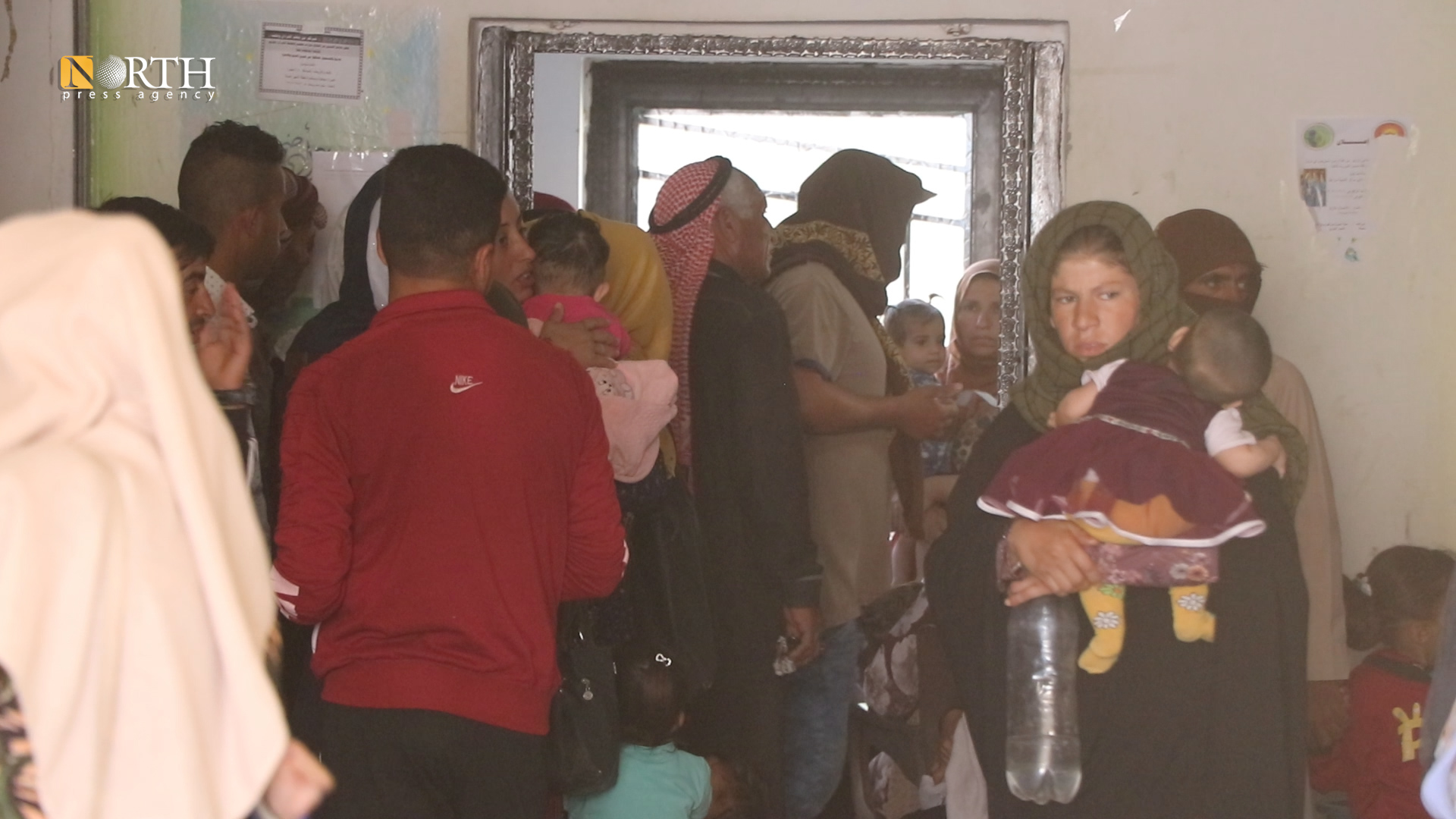TEL TAMR, Syria (North Press) –Muhammad al-Qadi, who is from the village of al-Rikba in the Tel Tamr countryside, northeast Syria, has been waiting for hours with his wife and child, who has been suffering from dehydration and abdominal pains for two days, in front of a clinic.
As a result of increasing temperatures in light of the power outage, Muhammad’s son is suffering from dehydration.
“We cannot operate conditioners, so we resort to the shade of the trees during daylight hours to escape high temperature inside rooms,” he said.
Most neighborhoods in Tel Tamr do not have the large generators which power whole areas known locally as amperes, and most residents do not have smaller personal ones in light of the electricity outages caused by the Turkish seizure of the Euphrates River.
Tel Tamr, like other areas in northeast Syria, is receiving almost no electricity, reaching one or two hours every two or three days.
For more than three months, Turkey has limited the flow of the Euphrates into Syria, depriving large numbers of people of usable water. Turkey reduced the flow of water from the Euphrates River into northeast Syria’s dam gradually, reducing the amount of water received to unprecedented lows.
Turkey keeps water in six dams, the largest of which is Ataturk Dam, the second largest in the Middle East, with a storage capacity of 48 billion m³, violating the international agreement they signed with Syria in 1987 which stated that Syria’s share of water coming from Turkey is 500 m³ per second.
The water flow to the Euphrates River is now limited to less than 200 cubic meters, according to the General Administration of Dams in Northeastern Syria.
200 patients per day
The only hospital in Tel Tam, Martyr Legerin Hospital, provides free medical services, and has been receiving about 200 patients on a daily basis since the onset of the summer season, according to hospital records.
There is a remarkable increase in the number of patients with hypertension and diabetes among the elderly, hospital manager Hassan Amir said.
With the advent of summer, seasonal illnesses increase, the most common of which are diarrhea, intestinal infections, typhoid, and skin diseases, according to doctors.
In addition to the Turkish seizure of the Euphrates River, the waters of the Khabur River passing by the town has been stagnating for years because Turkey has also prevented water flow from feeding the Autonomous Administration of North and East Syria (AANES)-held areas.
“The drought of the Khabur River, which turned into quagmires for insects and germs, attributes to the spread of diseases and causes skin diseases especially for children, who swim in,” Amin believes.
Additionally, cutting off water flow from Alouk station pushes people to significantly legalize using it during summer, “which requires a lot of water consumption, resulting in negligence of personal and environmental hygiene,” according to the hospital manager.
Residents of Hasakah are facing many difficulties in securing drinking water as a result of water cut and the decreasing water flow from Alouk station in the countryside of Sere Kaniye (Ras al-Ain).
Heat wave
Since the Turkish forces occupied the Sere Kaniye region and controlled the Alouk Water Station in 2019, they have cut off the water that feeds Hasakah, Tel Tamr, Shaddadi and its countryside for about 10 times.
Officials of the AANES accuse Turkey of decreasing the flow of drinking water from the station purposely.
Turkey demands more electricity to feed its areas of control in turn for operating a number of water turbines, according to a source from Hasakah water Directorate of Damascus government told North Press previously.
Despite providing Sere Kaniye with about 20 megawatts of electricity in turn for operating four turbines, “However, the weak pumping and low water flow reveal the false Turkish claims in keeping its promises,” according to sources in AANES.
As a result of climate change, the Hasakah region has been witnessing a severe heat wave in recent days, and the official bulletins of the Meteorological Department indicate that temperatures during the day may reach between 35 and 38 degrees Celsius, amid predictions of a rise in the coming days.
As a result of poor material conditions, Muhammad Ali, an IDP from al-Rayhaniya, which is under the control of Turkish forces and Turkish-backed armed groups, visited the hospital of the town in order to diagnose the condition of his child, who suffers from dehydration.
“Many children from the town, where I live, are suffering from dehydration and enteritis,” the IDP said.

